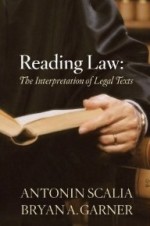Scalia’s and Garner’s New Book Suggests Principled Approach
 Readers of this blog may be surprised to know that I am a Scalia fan. Criminal defense lawyers who don’t like Jusice Scalia just don’t understand him yet. There is much to commend Jutice Scalia to a criminal defense attorney. He penned some of the most significant opinions in the last decade on the Confrontation Clause and criminal sentencing, if you are just judging him by results, which you shouldn’t do.
Readers of this blog may be surprised to know that I am a Scalia fan. Criminal defense lawyers who don’t like Jusice Scalia just don’t understand him yet. There is much to commend Jutice Scalia to a criminal defense attorney. He penned some of the most significant opinions in the last decade on the Confrontation Clause and criminal sentencing, if you are just judging him by results, which you shouldn’t do.
Results are not the reason to admire a judge (unless you are directly involved in a case and are on the winning side). In fact, you don’t have to agree with a judge’s philosophical approach to admire the judge. It is the fact that a judge has a principled approach to deciding cases that makes a judge great.
Lawyers who represent the accused on direct appeal and post-conviction and lawyers who regularly argue motions in trial courts are accustomed to judges with a philosophical-ish approach. And it isn’t textualism. It’s the approach that consists of finding a way to deny the motion or affirm the conviction because the defendant/appellant is a criminal defendant/appellant. It is the approach that looks to the State’s brief, in its 12 point Courier New glory with every other sentence in bold or italicized, to find a place to hang its hat.
So, Scalia’s and Garner’s book, which is written to encourage better judicial reasoning and decisionmaking, could be a welcome addition to the bookshelves of many judges.
Tony Mauro reviewed Reading Law: The Interpretation of Legal Texts at The National Law Journal. Mr. Mauro notes that the authors accuse judges of “loose and unprincipled decisionmaking that has tarnished the reputation of the judiciary.” And Mr. Mauro quotes a passage that seems to express the books’s central thesis:
The descent into social rancor over judicial decision is largely traceable to nontextual means of interpretation, which erode society’s confidence in a rule of law that evidently has no agreed-on meaning. … [o]ur legal system must regain a mooring that it has lost: a general agreed-on approach to the interpretation of legal texts.
Mr. Mauro notes that the book is “structured as a catalog of the canons of interpretation.” There are 57 of them in all. And the goal of it all is “to arrive at ‘one principled approach’ to interpretation through the analysis of a broad range of analytical methods.”
While many members of the public might see this book as a critique of “liberal” judicial activism or judicial legislation, it appears to be a broader critique of unprincipled judicial intrepretation of legal texts, no matter what motivates the abandonment of principle. Opinions on social issues, such as gay marriage or abortion, tend to make the news more than the daily grind of criminal cases. And it may be that the principled criminal law decision that leads to a bad factual result is the kind most likely to land on a newspaper’s front page. The 4th–6th Amendments of the Constitution die by a thousand tiny cuts. A principled approach to judging could save them.
And, with any luck, judicial readers of this new book will be just as textualist in their appraoch to the reading of transcripts, which could be the topic of another book. The abandonment of inconvenient facts in the record is every bit as big of a problem as the abandonment of the text of the law.
Adam Liptak has also reviewed the book, with an emphasis on how it might predict the outcome of the healthcare case.
Scalia/Garner’s book will hopefully cause judges to think about how they do the job of judging. Some of my favorite judges are the ones who rule on principle, even if in following that principle, they rule against me.


